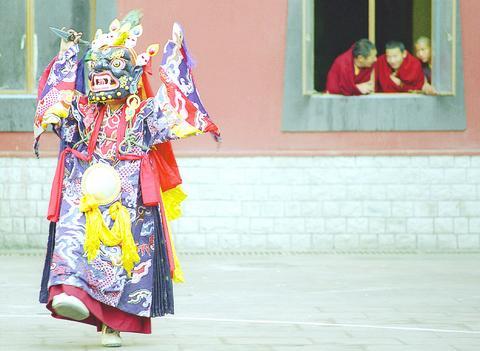Tibetans all over the world will celebrate their new year today and a small town in south India is preparing to rock through the night.
Yesterday was to see the end of 2030, the year of the "Water Sheep," and today the start of 2031, the year of the "Wood Monkey."

PHOTO: AP
The otherwise lazy town of Bylakuppe, about 300km from the IT hub of Bangalore, has a sizeable Tibetan population who are planning a party with a fete, ritual dances at monasteries and a music concert organized by new Tibetan group, Gonpo Entertainment.
"We are looking forward to the concert," said an excited youth. "We don't see such events in our settlement. The evening will be full of music and fun."
Some renowned Tibetan musicians from India, Nepal, the US and Switzerland are due to perform at the concert.
"We will have a 10,000 watt sound system to blast the concert!" said one of the organizers.
Bylakuppe is home to Sera monastery, which was re-established in the Indian town after the Chinese destroyed the original in Tibet.
It has a population of around 10,000, some 3,000 of whom are monks at the monastery.
In Dharamsala, the northern hillstation where the Tibetan government in exile has set up its headquarters, Losar will be celebrated in prayer and in family reunions, officials said.
With exiled Tibetan spiritual leader the Dalai Lama being on retreat, the prayer ceremony, Tsedor, on the first day of the Tibetan New Year, will be led by the chief abbot of Namgyal monastery in Dharamsala.
The Tibetan lunar calendar was adopted from the Chinese system during the reign of 7th century Tibetan king Songtsen Gampo. The king's Chinese consort, Wengchen Kongjo, brought the Chinese calendar to Tibet.
The preparations begin on the 29th day of the 12th Tibetan month with ritual ceremonies to drive away evil spirits so that the New Year will begin with fresh positive energies.
On New Year's eve, the altars are decorated with offerings of edibles and religious relics. Food and drink stocks are piled well in advance.
During the holidays, which usually last one week, new clothes are made, houses and their surroundings are cleaned and walls are painted.

Drug lord Jose Adolfo Macias Villamar, alias “Fito,” was Ecuador’s most-wanted fugitive before his arrest on Wednesday, more than a year after he escaped prison from where he commanded the country’s leading criminal gang. The former taxi driver turned crime boss became the prime target of law enforcement early last year after escaping from a prison in the southwestern port of Guayaquil. Ecuadoran President Daniel Noboa’s government released “wanted” posters with images of his face and offered US$1 million for information leading to his capture. In a country plagued by crime, members of Fito’s gang, Los Choneros, have responded with violence, using car

Two former Chilean ministers are among four candidates competing this weekend for the presidential nomination of the left ahead of November elections dominated by rising levels of violent crime. More than 15 million voters are eligible to choose today between former minister of labor Jeannette Jara, former minister of the interior Carolina Toha and two members of parliament, Gonzalo Winter and Jaime Mulet, to represent the left against a resurgent right. The primary is open to members of the parties within Chilean President Gabriel Boric’s ruling left-wing coalition and other voters who are not affiliated with specific parties. A recent poll by the

TENSIONS HIGH: For more than half a year, students have organized protests around the country, while the Serbian presaident said they are part of a foreign plot About 140,000 protesters rallied in Belgrade, the largest turnout over the past few months, as student-led demonstrations mount pressure on the populist government to call early elections. The rally was one of the largest in more than half a year student-led actions, which began in November last year after the roof of a train station collapsed in the northern city of Novi Sad, killing 16 people — a tragedy widely blamed on entrenched corruption. On Saturday, a sea of protesters filled Belgrade’s largest square and poured into several surrounding streets. The independent protest monitor Archive of Public Gatherings estimated the

Irish-language rap group Kneecap on Saturday gave an impassioned performance for tens of thousands of fans at the Glastonbury Festival despite criticism by British politicians and a terror charge for one of the trio. Liam Og O hAnnaidh, who performs under the stage name Mo Chara, has been charged under the UK’s Terrorism Act with supporting a proscribed organization for allegedly waving a Hezbollah flag at a concert in London in November last year. The rapper, who was charged under the anglicized version of his name, Liam O’Hanna, is on unconditional bail before a further court hearing in August. “Glastonbury,